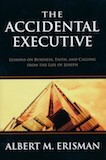Grow Up: What Do We Need If We’re Going to Grow Into Genuine Unity as God’s People?
Daily Reflection / Produced by The High Calling
So Christ himself gave the apostles, the prophets, the evangelists, the pastors and teachers, to equip his people for works of service, so that the body of Christ may be built up until we all reach unity in the faith and in the knowledge of the Son of God and become mature, attaining to the whole measure of the fullness of Christ. Then we will no longer be infants, tossed back and forth by the waves, and blown here and there by every wind of teaching and by the cunning and craftiness of people in their deceitful scheming. Instead, speaking the truth in love, we will grow to become in every respect the mature body of him who is the head, that is, Christ. From him the whole body, joined and held together by every supporting ligament, grows and builds itself up in love, as each part does its work.
Ephesians 4:11
Last Friday, we reflected on the fact that our growth as the body of Christ entails growing into deeper unity. Our passage from Ephesians reveals that all of God's people are to engage in "works of service" or ministry, "so that the body of Christ may be built up until we all reach unity" (4:12-13).
But what is Christian unity all about? How is it created and sustained? Sometimes Christians bandy about the word "unity" without a biblical understanding of what it really is. Unity can refer to warm fuzzies that come when we sing "Kum Ba Yah" around a campfire. Or it can mean pretending that our theological differences don't matter. Sometimes unity can even serve as a weapon to batter those who worry that the church has lost its biblical moorings.
Ephesians 4:13 helps us to learn what true Christian unity is and how it can be experienced. The phrase "until we all reach unity" continues on: "until we all reach unity in the faith and in the knowledge of the Son of God." Unity has to do with shared faith and knowledge.
In the reflections for Tuesday and Wednesday, I'll focus on the nature of faith and knowledge in relationship to unity. But, for now, I want to point out a couple of things that faith and knowledge are not. First, they are not feelings. Faith and knowledge might include emotional elements, but they are not primarily emotional. Both suggest, as we'll see, an essential rational element.
Second, faith and knowledge are both relational. They both have to do with our relationship to God. We don't just have faith, but we have faith in God, the God who is revealed through Jesus Christ. We don't just have spiritual knowledge, but we have knowledge "of the Son of God." Thus, if we want to be unified as Christians, we should begin by considering our relationship with God. Yes, our relationships with people matter. Christian unity is, after all, unity among brothers and sisters in Christ. But, the heart of Christian unity is our common relationship with God through Jesus Christ. If we want true unity, here's where we must focus.
QUESTIONS FOR FURTHER REFLECTION: When you hear the phrase "unity in the faith," what comes to mind? What is "the faith"? Similarly, when this passage speaks of "unity . . . in the knowledge of the Son of God," how do you understand this? How would you describe your faith in and knowledge of God?
PRAYER: Gracious God, may the vision of this passage be true of my life and the life of my church. May we grow into greater unity "in the faith and in the knowledge of the Son of God."
Help me, Lord, in my own growth as a Christian, to grow into deeper, truer faith in you. And help me to know the Son of God more truly and intimately. May this be the case, even today, Lord. Amen.
Image courtesy of Laity Lodge Youth Camp, one of our sister programs in the Foundations for Laity Renewal.






